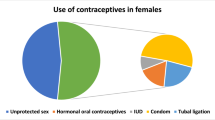Abstract
Vaginal practices are a variety of behavioral techniques that women use to manage their sexual life and personal hygiene. Women perceive vaginal practices as a beneficial practice. However, vaginal cleansing has been identified as one of the main risk factors for bacterial vaginosis and is potentially implicated in Human Immune Deficiency Virus (HIV) and sexually transmitted infection transmission. This study examined the prevalence of vaginal practices and the types of practices used among a sample of HIV positive women living in Lusaka, Zambia. Over 90% of all women recruited engaged in vaginal practices. Certain practices, such as use of water or soap, were more frequently used for hygiene reasons. Herbs and traditional medicines were mainly used to please sexual partner. Strategies to decrease VP appear urgently needed in the Zambian community.
Resumen
Las prácticas vaginales son utilizadas por las mujeres para controlar su sexualidad e higiene personal. La mayoría de las mujeres que utilizan practicas vaginales las consideran beneficiosas. Sin embargo, la excesiva higiene vaginal facilita el desarrollo de vaginosis bacteriana y podría aumenta el riesgo de transmitir el virus de la inmunodeficiencia humana (VIH) y otras enfermedades de transmisión sexual. Este estudio describe la prevalencia de prácticas vaginales y los tipos de prácticas utilizadas por mujeres VIH positivas en Lusaka, Zambia. Más del 90% de las mujeres utiliza algún tipo de prácticas vaginales. El agua y jabón se utilizan principalmente por motivos higiénicos. Las plantas y medicinas tradicionales se utilizan principalmente para aumentar el placer sexual de la pareja. Estrategias para disminuir las prácticas vaginales son necesarias en la comunidad femenina de Zambia.
Similar content being viewed by others
References
Sandala L, Lurie P, Sunkutu MR, et al. ‘Dry sex’ and HIV infection among women attending a sexually transmitted diseases clinic in Lusaka, Zambia. AIDS. 1995;9(1):S61–8.
Beksinska ME, Rees HV, Kleinschmidt I, et al. The practice and prevalence of dry sex among men and women in South Africa: a risk factor for sexually transmitted infections? Sex Transm Infect. 1999;75(3):178–80.
Allen C, Desmond N, Chiduo B, et al. Intravaginal and menstrual practices among women working in food and recreational facilities in Mwanza, Tanzania: implications for microbicide trials. AIDS Behav. 2010;14(5):1169–81.
Gallo M, Sharma A, Bukusi E, et al. Intravaginal practices among female sex workers in kibera, Kenya. Sex Transm Infect. 2010;86:318–22.
Fonck K, Kaul R, Keli F, et al. Sexually transmitted infections and vaginal douching in a population of female sex workers in Nairobi, Kenia. Sex Transm Infect. 2001;77:271–5.
Ness RB, Hillier SL, Richter HE, et al. Why women douche and why they may or may not stop. Sex Transm Dis. 2003;30(1):71–4.
McClelland R, Lavreys L, Hassan W, Mandaliya K, Ndinya-Achola JO, Baeten JM. Vaginal washing and increased risk of HIV acquisition among African women: a 10-year prospective study. AIDS. 2006;20(2):269–73.
Fethers K, Fairley CK, Hocking J, Lyle G, Bradshaw C. Sexual risk factors and bacterial vaginosis: a systematic review and meta-analysis. Clin Infect Dis. 2008;47:1426–35.
Van de Wijgert JH, Morrison CS, Cornelisse PG, et al. Bacterial vaginosis and vaginal yeast, but not vaginal cleansing, increase HIV-1 acquisition in African women. J Acquir Immune Defic Syndr. 2008;48(2):203–10.
Farquhara C, Mbori-Ngachac D, Overbaughd J, et al. Illness during pregnancy and bacterial vaginosis are associated with in utero HIV-1 transmission. AIDS. 2010;24:153–7.
Cu-Uvin S, Hogan J, Caliendo A, et al. Association between bacterial vaginosis and expression of human immunodeficiency virus type 1 RNA in the female genital tract. Clin Infect Dis. 2001;33:894–6.
Hilber A, Francis C, Chersich M, et al. Intravaginal practices, vaginal infections and HIV acquisition: systematic review and meta-analysis. PLoS One. 2010;5(2):e9119.
Low N, Chersich M, Schmidlin K, Egger M, Francis S, Van de Wijgert S, et al. Intravaginal practices, bacterial vaginosis, and HIV infection in women: individual participant data metaanalysis. PLoS Med. 2011;8(2):1000416.
Zambia country report. Zambia Ministry of Heatlh; 2008.
Mbikusita-Lewanika M, Stephen H. The prevalence of the use of ‘dry sex’ traditional medicines, among Zambian women, and the profile of the users. J Psychol Health Med. 2009;14(2):227–38.
Norris Turner A, Morrison C, Munjoma M, Moyo P, Chipato T, et al. Vaginal practices of HIV negative Zimbabwean women. Infec Dis Obst Gyn. 2010;2010:387671.
Kapina M, Reid C, Roman K, et al. HIV incidente rates and risk factors for urban women in Zambia: preparing for a microbicide clinical trial. Sex Transm Dis. 2009;36(3):129–33.
Acknowledgments
This study was funded by grant from the National Institute of Health, R01HD058481S1. We thank all those in our research team at the University Teaching Hospital in Lusaka, community sites providing referrals, and the women participating in this study. The opinions reflected in this report are those of the authors and do not necessarily reflect those of the funding agencies and participating institutions.
Disclosure
No competing financial interests exist.
Author information
Authors and Affiliations
Corresponding author
Rights and permissions
About this article
Cite this article
Alcaide, M.L., Mumbi, M., Chitalu, N. et al. Vaginal Cleansing Practices in HIV Infected Zambian Women. AIDS Behav 17, 872–878 (2013). https://doi.org/10.1007/s10461-011-0083-z
Published:
Issue Date:
DOI: https://doi.org/10.1007/s10461-011-0083-z




